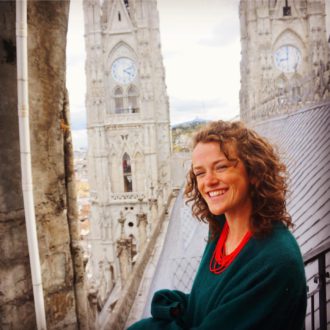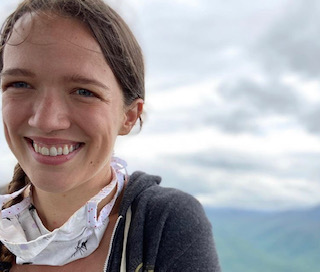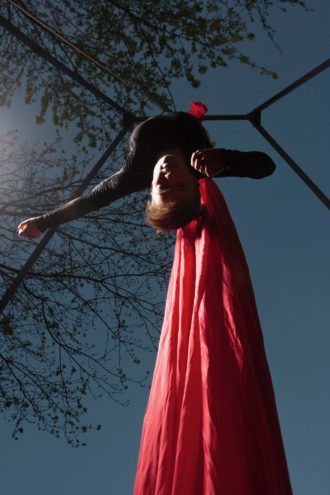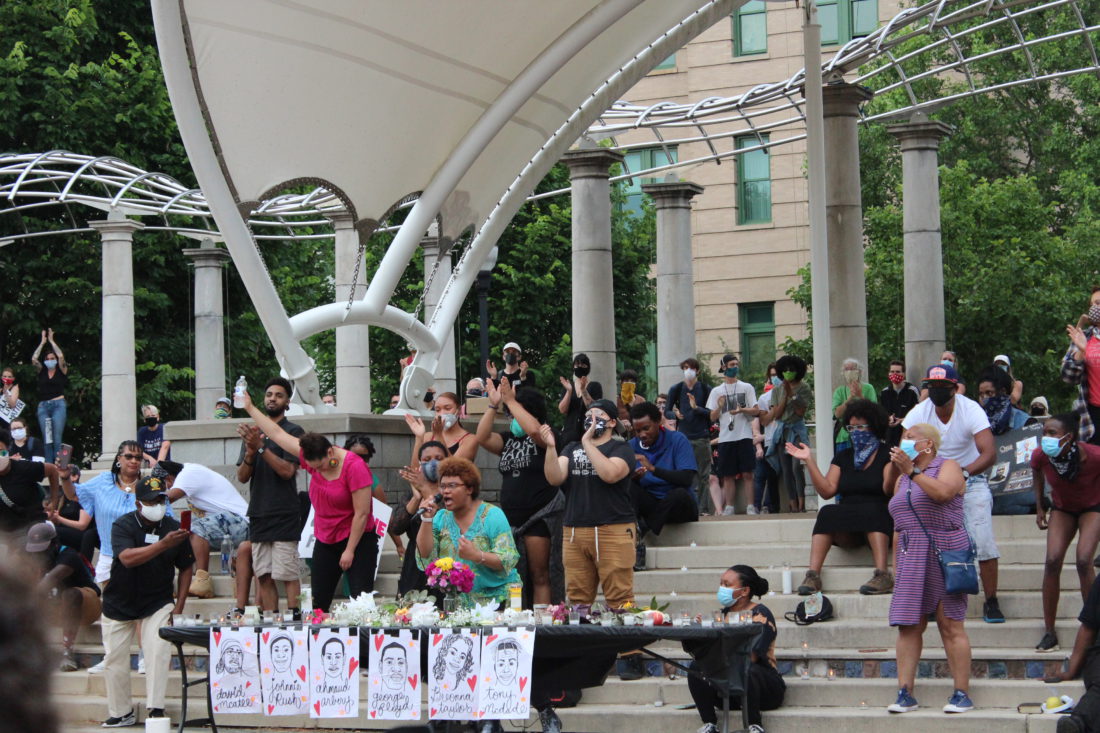Asheville made national headlines the night of June 2, when Asheville Police Department officers destroyed medical supplies and forcibly handled volunteer medics during international protests for racial justice after the police killing of Black Minneapolis resident George Floyd. In the aftermath, members of Asheville City Council considered commissioning an outside investigation into the tactics used by the APD during the multiday protests, which saw law enforcement use tear gas and rubber bullets against demonstrators. But residents questioned the wisdom of spending over $80,000 on the investigation, which many feared would simply be used to rationalize police actions.
On July 28, Council’s Public Safety Committee, consisting of Brian Haynes, Sheneika Smith and Gwen Wisler, met to reconsider the best approach to understanding what happened.
After deliberation, the Council members proposed the APD continue an internal investigation of the activities during the protest period and discipline any officers found to be in violation of existing policies accordingly. The city’s Legal Department, they agreed, should continue to evaluate the top-level decisions made during the protests. Finally, the Council should request body camera footage from the officers present at the medic station, on Asheville’s Bowen Bridge and those actively tasked with using crowd control tactics — a move that worried Wisler, who said it could jeopardize the safety of APD officers if their names or the videos become public. All recommendations will go before the full Council at a later date.
The committee also hopes to find a meaningful way for community members to share their stories from the protests. Xpress spoke with several people who were present at the medic station on June 2; they say the reasons for their outrage go far beyond the destruction of water bottles and supplies. Here, they recount their experiences.
I
Liyah Foye’s hand-lettered sign read, “It’s not just Black lives that matter. Black thoughts matter, Black actions matter, Black feelings matter. I matter.”
Foye, who identifies as a Black woman, was downtown demonstrating the night of June 2. As the 8 p.m. curfew approached, she saw police officers lining up opposite the peaceful protesters. People in the crowd began yelling; the police officers were “heavily armed,” she says.
“I am a Black woman in America,” Foye explained in a video she posted to her Facebook page on June 3. “If I hear ‘armed policeman,’ I’m not going to resist it. I’m going to get out.”
She remembered hearing that the medic station would be left alone, so she quickly made her way down Patton Avenue to the alley leading to One World Brewing, where the medics were setting up. Fearful of the police, Foye said she asked the medics if she could stand with them and blend in. The medics immediately began shielding Foye, but suddenly, the APD was there, screaming that the medics had to get out.
One officer looked at Foye, and immediately she was filled with terror, she recalls. “It was so hateful the way that they were looking at me,” she said. “In that moment, I felt so much fear.”
The event was traumatic, Foye says — and adds to the microaggressions and hostility she feels in white-dominated spaces within the city.
“For the APD to use physical force and destroy products that were meant to help their citizens is disgusting and dehumanizing,” she says. “It’s not OK what happened to me.”
II
Greenleaf Clarke Prentice made a point of bringing kneepads to the June 2 protests. The night before, the protester (who uses they/them pronouns) had their knees sliced by shrapnel as they tended to injuries in the crowd. After seeing someone get hit in the head, they threw in a helmet and goggles, just in case. “Ironically, we didn’t need any of that,” they explained.
Initially, Clarke Prentice and their partner, Gillian Maurer, planned to operate solo, but when they saw the triage station, they decided it was safer to work with a group. They arrived with just enough time to don a white cross designating their medic status and agree they would put their hands in the air if police showed up. And then curfew hit.
At first, all was quiet. Then, a van door opened and slammed shut, and Clarke Prentice heard boots hitting the ground. Police in full riot gear marched down the street, they said, and as the officers passed the alley, the group suddenly pivoted, forming a wedge formation in what Clarke Prentice describes as “the shape of an X-Acto knife.”
“We all realized what was happening in about half a second,” they said. “And then it was chaos.”
In the incident’s aftermath, Clarke Prentice explains, the medics realized they had a national platform to amplify Black and brown voices. But every time a newspaper picked up the story, the response was “woe is the medics,” Clarke Prentice says.
“But that’s just the first part of the conversation,” they explain. “The second part needs to be, why are they only caring about this one situation? So many times, it’s not an ironclad group of majority white, majority female-presenting medics. So often people make excuses, but police violence is never excusable.”
III

In the midst of the action, one of the APD officers grabbed Annie Lou Heath by the coat and threw her to the ground. Heath, who says she’s maybe 120 pounds on a good day, had never experienced being in a physical confrontation with another person.
“I feel like I got this teeny tiny glimpse of what it’s like to be treated like that, and it was so horrible and scary in the moment,” she explained.
“But I was not arrested or injured,” Heath continued. “I got out of it pretty lucky and very privileged. And that’s not the way the story goes for most people of color.”
IV

As a white person, Glenna Grant didn’t feel her place was on the front lines shouting and yelling. The world has heard enough from white voices, she explains, emphasizing that the story is not about what happened to her and the other medics, but institutionalized racism and the centuries-long battle fought by Black and brown communities to feel safe in their own city.
“What we experienced was that sort of jarring realization that law enforcement may not be as interested in understanding you or treating you with empathy and compassion,” she says. “That’s something people of color have known for a long time.”
After reflecting on the evening, Grant says she was struck that people in the crowd felt safer going to a group of volunteers for help than they did approaching professionals in uniform. The realization does not speak highly of the medics, she says, but rather reveals a dysfunctional system causing harm.
“I have no doubt we benefited from our privilege that night,” Grant says. “I certainly did, because I am not traumatized. And I think the reason I’m not traumatized is because, as a white woman, I don’t have generational trauma around law enforcement.”
V

One of the most concerning aspects of the incident for Gillian Maurer, who was halfway down the alley when APD arrived, was that the officers appeared to be trained and given orders to meet peaceful medics with force.
“Had there been a higher volume of people of color or people who were not there to provide medical attention or people that were in some way trying to defend their ability to stay there, things would likely have escalated much, much faster than they did in this situation,” says Maurer, who uses they/them pronouns.
To Maurer’s knowledge, the only injuries to the medical volunteers were some bruises and scrapes, they said. But APD’s intimidation tactics are just one piece of the puzzle.
“A lot of the indignation is of the fact that they stabbed water bottles,” Maurer notes. “But from my perspective, the much more concerning part of this is that the APD was trained and ordered to use this kind of force. In this situation, it’s indicative of a much broader issue that puts a lot of people of color in the city at a much greater risk.”





You can smell the privilege in this one. Favorite quote “As a white person, Glenna Grant didn’t feel her place was on the front lines shouting and yelling. The world has heard enough from white voices,” So you do an article instead…..
Why don’t you volunteer your time to teach children of color thru tutoring, or just being a Big Brother, Big Sister, great organization. Or just helping with the process thru you City Council or one of the many commissions it has, or better yet become a cop yourself, if you are such a righteous person and fix the problem from within.